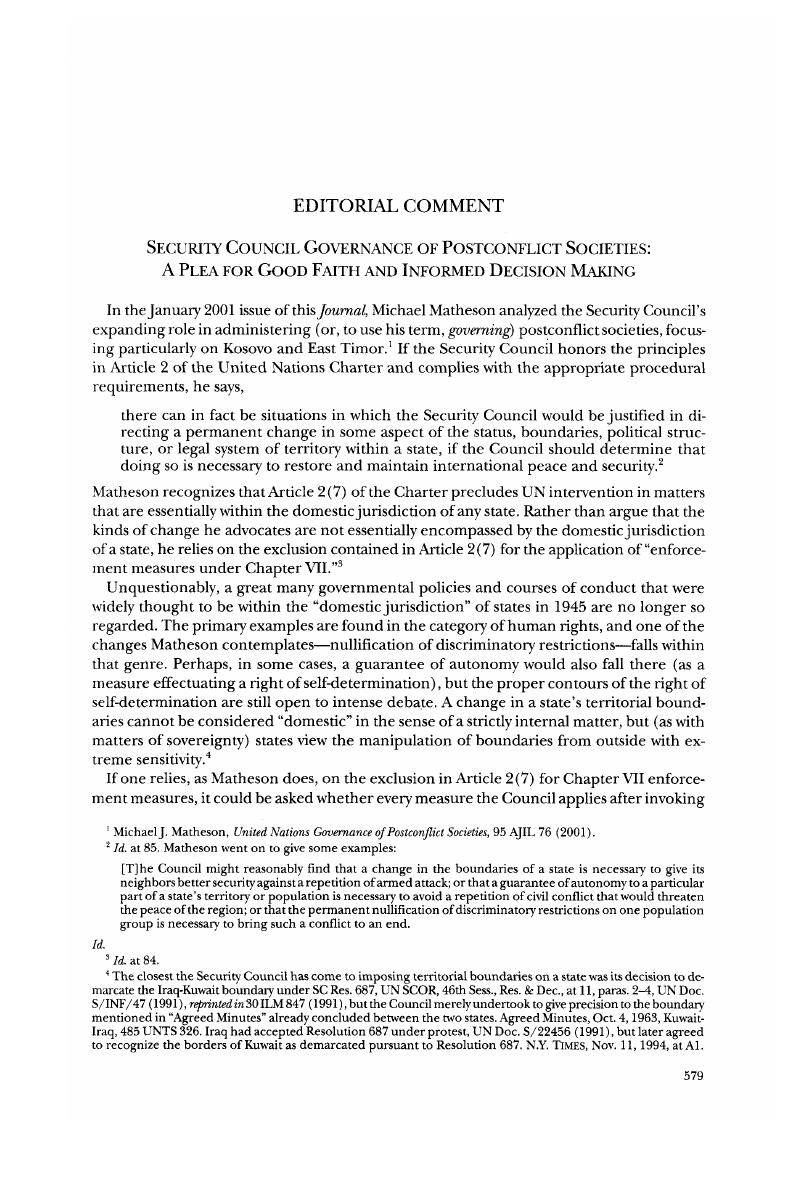No CrossRef data available.
Article contents
Security Council Governance of Postconflict Societies: A Plea for Good Faith and Informed Decision Making
Published online by Cambridge University Press: 06 June 2017
Abstract

- Type
- Editorial Comment
- Information
- Copyright
- Copyright © American Society of International Law 2001
References
1 Michael, J. Matheson, United Nations Governance of Postconflict Societies, 95 AJIL 76 (2001)Google Scholar.
2 Id. at 85. Matheson went on to give some examples:
[T]he Council might reasonably find that a change in the boundaries of a state is necessary to give its neighbors better security against a repetition of armed attack; or that a guarantee of autonomy to a particular part of a state’s territory or population is necessary to avoid a repetition of civil conflict that would threaten the peace of the region; or that the permanent nullification of discriminatory restrictions on one population group is necessary to bring such a conflict to an end.
Id.
3 Id. at 84.
4 The closest the Security Council has come to imposing territorial boundaries on a state was its decision to demarcate the Iraq-Kuwait boundary under SC Res. 687, UN SCOR, 46th Sess., Res. & Dec, at 11, paras. 2-4, UN Doc. S/INF/47 (1991), reprinted in 30 ILM 847 (1991), but the Council merely undertook to give precision to the boundary mentioned in “Agreed Minutes” already concluded between the two states. Agreed Minutes, Oct. 4, 1963, Kuwait- Iraq, 485 UNTS 326. Iraq had accepted Resolution 687 under protest, UN Doc. S/22456 (1991), but later agreed to recognize the borders of Kuwait as demarcated pursuant to Resolution 687. N.Y. Times, Nov. 11, 1994, at A1.
3 UN Charter Article 50 provides:
If preventive or enforcement measures against any state are taken by the Security Council, any other state . . . which finds itself confronted with special economic problems arising from the carrying out of those measures shall have the right to consult the Security Council with regard to a solution of those problems.
6 Id., Article 2(5) provides: “All Members . . . shall refrain from giving assistance to any state against which the United Nations is taking preventive or enforcement action.”
7 Jochen Abr. Frowein, Article 2(5), in The Charter of the United Nations: A Commentary 129-30 (Bruno Simma ed., 1994). Frowein does not set forth a clear meaning of “preventive action.”
8 Boutros Boutros-Ghali, an Agenda for Peace 5-13, 16-17, UN Doc.A/47/277-S/24111 (1992), UN Sales No. E.95.I.15 (1995). See also the sequel, UN Doc. A/48/403-S/26450, at 3-4 (1994), and the Note by the President of the Security Council on Post-Conflict Peace-Building, UN Doc. S/25696 (1993).
9 Report of the Special Subcomm. of Comm. IV/2 on the Interpretation of the Charter, Doc. 750, IV/2/B/1, 13 U.N.C.I.O. Docs. 831-32 (1945).
10 The Court has said that “when the Organization takes action which warrants the assertion that it was appropriate for the fulfilment of one of the stated purposes of the United Nations, the presumption is that such action is not ultra vires the Organization.” Certain Expenses of the United Nations (Article 17, Paragraph 2, of the Charter), Advisory Opinion, 1962 ICJ Rep. 151, 168 (July 20). This is not to say that the Court should always refrain from declaring such action ultra vires. See Thomas, M. Franck, The United Nations as Guarantor of International Peace and Security: Past, Present and Future, in The United Nations at Age Fifty 25, 36-37 (Tomuschat, Christian ed., 1995)Google Scholar.
11 Any such expansion assumes, of course, that sovereignty-sensitive permanent members of the Council will not veto resolutions imposing permanent governance measures on member states—a large assumption.
12 Such a determination is a prerequisite for a decision on measures under Chapter VII. Jochen Abr. Frowein, Article 39, in The Charter of The United Nations, supra note 7, at 605, 613.
13 Conditions of Admission of a State to Membership in the United Nations (Charter, Article 4), Advisory Opinion, 1948 ICJ Rep. 57, 63 (May 28).
14 See generally O’connor, J. F., Good Faith in International Law (1991)Google Scholar.
15 Thomas, M. Franck, Fairness in International Law and Institutions 220 (1995)Google Scholar.
16 See, e.g., SC Res. 940, UN SCOR, 49th Sess., Res. & Dec, at 51, UN Doc. S/INF/50 (1994) (concerning the political situation in Haiti).
17 Provisional Rules of Procedure of the Security Council, Rule 28, UN Doc. S/96/Rev.7 (1983). The authority for this rule is found in UN Charter Article 29: “The Security Council may establish such subsidiary organs as it deems necessary for the performance of its functions.”


